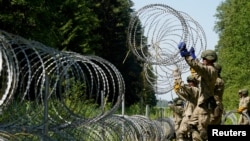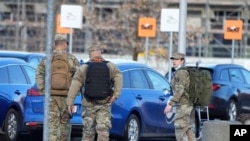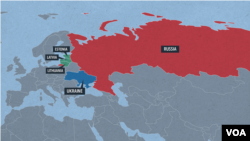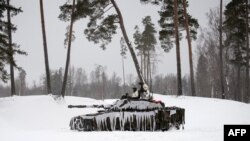The former communist countries of eastern Europe are growing increasingly nervous about what they see as a revanchist Russia, with their governments carefully watching the Ukraine crisis for clues to where else Russian leader Vladimir Putin could stir trouble.
Britain announced Monday that 350 Royal Marine Commandos who were on exercises in Norway will be diverted to Poland to take part in “contingency planning.” The move comes as tensions build around Russia’s deployment of forces on Ukraine’s borders in the biggest military build-up since 1945.
A British defense official said the diversion is about “reassurance to eastern European partners” who fear Putin is using Ukraine as a battering ram in a campaign to upend the post-Cold War security settlement in Europe and reestablish a Russian sphere of influence across Eastern Europe.
And Britain’s Prime Minister Boris Johnson said Tuesday he is prepared to deploy warplanes to Bulgaria and Romania and warships to the Black Sea. Britain will not “flinch,” he said.
NATO presence
NATO has troops rotating in and out of eastern Europe in what officials in the Western alliance’s headquarters in Brussels describe as a persistent, but not permanent, presence. They say troop deployments have been intentionally light from the Baltics to the Black Sea in a bid to deter but not to provoke Russian aggression.
Since Russia’s annexation of Crimea in 2014, there have been four battle groups containing a total of 5,000 troops in Estonia, Latvia, Lithuania and Poland, led by the U.S., Germany, Canada and Britain.
The United States has ordered a further 3,000 troops to strengthen the defenses of NATO's eastern allies, with the first arriving Saturday at Rzeszów military base in southeastern Poland. And Germany is preparing to reinforce its small battle group of 1,200 troops currently in Lithuania
NATO is considering a longer-term military posture in eastern Europe, the alliance’s Secretary-General Jens Stoltenberg said Monday.
“We are considering more longer-term adjustments to our posture, our presence in the eastern part of the alliance. No final decision has been made on that but there is a process now going on within NATO,” he told reporters in Brussels.
Stoltenberg’s remarks were praised by eastern European governments.
“Based on historical experience, we see that only a decisive deterrence policy can stop any potential Russian aggression and based on the very same history, we do see that the policy of appeasement only encourages the potential enemy to do something,” Mariusz Blaszczak, the Polish defense minister, said Monday.
Putin’s next move
Polish analysts say there are real fears in central and eastern Europe that settled borders are now under threat. If Putin decides to add more Ukrainian territory to what he seized in 2014, they ask, what will stop him from using coercive diplomacy or hybrid warfare to manufacture a crisis elsewhere?
Putin has frequently lamented that the breakup of the Soviet Union left 25.3 million ethnic Russians outside the Russian Federation, many of them living in former Soviet republics, including the Baltic states. The presence of a sizable ethnic Russian minority in Ukraine has been used by the Kremlin for leverage, and some leaders of the Baltic states of Estonia, Lithuania and Estonia worry the same could happen with their countries.
“In Warsaw, Vilnius, Riga and Tallinn, the mood is full of anxiety,” say historian Karolina Wigura and political analyst Jarosław Kuisz.
“The Russian military menace to Ukraine reawakens old traumas and, paradoxically, not only those generated from the east. Another angst is, to put it bluntly, that the West will again abandon us,” they added in a commentary.
"Many citizens of central and eastern Europe have clear memories of living under Moscow’s rule. For them, 30 years of independence is not long enough to banish the worry that we are trapped in a cycle of ever-repeating history,” they added.
NATO deployments — which are dwarfed by Russia’s military buildup — are going some way to steady nerves but there are fears that Putin no longer feels bound by the post–Cold War order, which he believes is against Russia’s national interests. Russian troll factories have long targeted the Baltic states with disinformation using messaging similar to the propaganda focused on Ukraine — namely NATO is occupying them, and Russian minorities are under threat, say analysts.
Kaja Kallas, Estonia’s prime minister, said recently: “The Baltic states are a NATO peninsula and therefore we have our worries.”
Estonia has been the target of a series of cyber-attacks since 2007, which are blamed on Russia and started amid an Estonian-Russian row about the relocation of a Soviet memorial in Tallinn.
Nearly a quarter of Estonia’s population is ethnic Russian, and while integration has proceeded apace most ethnic Russians send their children to Russian language schools and watch Russian media. The country’s third largest city, Narva, is 80% ethnic Russian and analysts see it as the most likely target for Moscow if the Kremlin decides to foment trouble.
Arvydas Anusauskas, the Lithuanian defense minister, points to the channeling of Russian troops to neighboring Belarus for large-scale military exercises as unnerving and says the drills pose a “direct threat” to his country.
Relations between Lithuania and Russia have also been frosty since the country became the first of the Baltic states, and first Soviet republic, to gain independence in 1990. Russian troops remained in Lithuania for another three years as then-Russian leader Boris Yeltsin linked troop withdrawals to issues concerning the Russian minority in the country. Fifteen percent of Lithuania’s population is ethnic Russian. Since independence, Lithuanian leaders have visited Moscow only three times.
“This is now an area full of weaponry. Russian troops that are in the south of his country can be moved very quickly. There are sorts of hybrid attacks under way. Pipelines falling apart. This is how unfortunately these regimes operate. There are no red lines they will not cross,” she said.
Šimonytė questioned Monday’s meeting between French President Emmanuel Macron and Putin, displaying wariness about the French president’s diplomatic mission to Moscow. Like other Baltic leaders, she is wary of the idea, apparently mooted by Macron, that Ukraine should be blocked from joining NATO. Reports said Macron suggested Ukraine should remain permanently neutral.
“Neutrality helps the oppressor and never the victim,” Šimonytė said.
Lithuanian defense officials fear the Russian exclave of Kaliningrad, which is squeezed between Poland and Lithuania on the Baltic Sea, could become the focus for a dangerous economic and military conflict between Russia and NATO, especially if the Western alliance doesn’t stand up to the Kremlin in the crisis over Ukraine.
“This is a 1938 moment for our generation,” Ingrida Šimonytė, Lithuania’s prime minister, told Britain’s Guardian newspaper, a reference to the appeasement of Nazi Germany by the British and French. She fears substantial Russian forces will remain indefinitely in Belarus whatever happens in Ukraine and that would change the security landscape.













